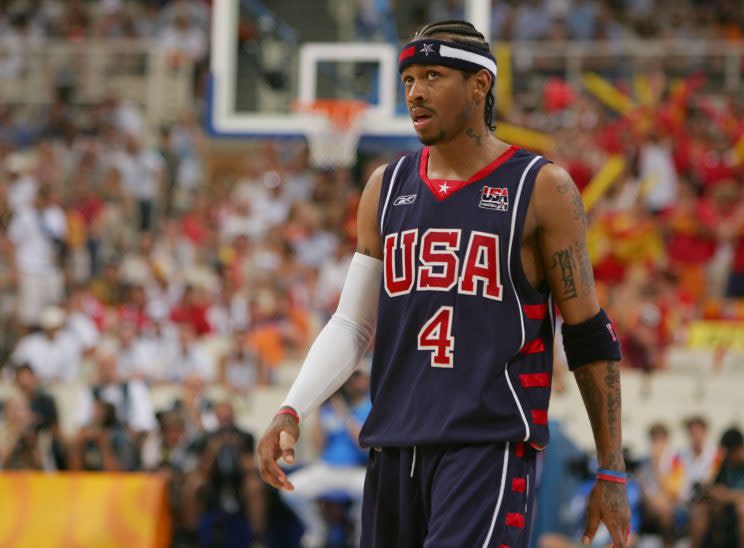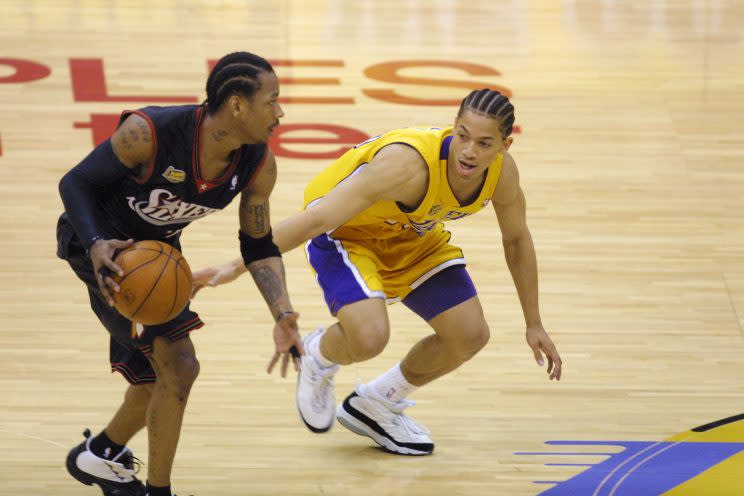When Allen Iverson was at his most real
Allen Iverson didn’t become real to me until the 2004 Olympics. Until then, all Iverson had been was a middle finger in high tops, a character, a caricature whose cornrows, headband, tattoos, gold and platinum chains, oversized T-shirts and raspy baritone were all part of a genuine package that required no explanation.
The Michael Jordan crossover. The Tyronn Lue step over. The infamous “practice” rant. Iverson won four scoring titles and interrupted the Shaquille O’Neal and Tim Duncan run of big-man dominance in the early 2000s to sneak out an MVP award for the little guys. Those were the defining moments of his unconventional career, but that summer in Athens helped me understand Iverson better than any grainy YouTube clip or unfairly mocked expression of frustration.

Failure is always attached to that 2004 Olympic team because of the embarrassing bronze-medal finish. Considered a disaster for USA Basketball, that version of Team USA was the impetus for a revamped program that yielded the Redeem Team and three consecutive gold medals. But few remember it as the moment when Iverson proved himself to be accountable and accommodating during those humiliating two weeks.
Iverson was one of the few players who qualified the previous summer for the Olympics and decided to fulfill his obligation. Most others backed out of the first post-9/11 Summer Games, leaving an ill-prepared team thrown together at the last minute to receive the scorn.
Losing led some to point fingers and make excuses, but Iverson acknowledged the shame, answered the difficult questions and offered some much-needed perspective. That team risked leaving Greece without a medal of any kind after a disappointing loss to Argentina in the semifinals. Iverson wouldn’t let the team bottom out, however, explaining why it was important for guys to play with pride for as long as they wore those uniforms. The U.S. beat Lithuania, and Iverson was one of the few players who smiled during the medal ceremony.
Iverson never got the Olympic redemption he wanted, but his summer as “Captain America” reflected the appreciation he felt for a country that wasn’t very welcoming upon his arrival from the slums of southeast Virginia and at times seemed resentful of his ability to still find success.
Before covering the only pro U.S. Olympic men’s basketball team to claim bronze, I knew Iverson like most everyone else – from a distance, forming an opinion based mostly on what I’d read and witnessed on the court. Afterward, I saw him as a patriot who understood his purpose.

Iverson needed more than talent to get out of Hampton, Va., as many others had the gifts but lacked the grit. He needed gubernatorial clemency and a release from prison to pursue his dreams after a bowling alley brawl in high school nearly derailed his future. Despite those obstacles, Iverson made it and flaunted the fairy tale rather than feeling persecuted.
The defiant outlier who eventually redefined the norm, Iverson was the unlikely pioneer for a movement that took hip-hop from the hood to the hardwood and every other neighborhood. Iverson became a cultural icon and a symbol for unfettered individuality because of his unwillingness to conform and compromise. He demanded to be accepted, couldn’t be ignored and was embraced for his authenticity.
Those qualities also made Iverson a reviled figure to those who couldn’t look beyond the unusual exterior to find a young man struggling to remain true through the adjusted expectations that come from fame and wealth. He stumbled, embarrassingly so, and let his gashes be exposed with the nonchalance of the ink on his neck. His refusal to be judged by anyone who couldn’t and wouldn’t try to understand what he survived endeared him even more to fans.
You weren’t cheated when watching Iverson in uniform. Iverson liked to say that he played every game as if it were his last, and part of what made him so fascinating was the anxiety that it really could all end with his next reckless drive to the hoop – or some off-court mishap. But he kept taking those hits, kept getting up. He was either immune to the pounding or empowered by it, so relentless that you could forgive him for being an inefficient chucker. He was frail but fearless, feared and flawed.
The NBA often seemed to be at odds with Iverson. A league-sponsored publication once airbrushed his tattoos from a magazine cover to seemingly make him more palatable. Former commissioner David Stern urged Iverson not to release a violent, profanity-laced rap album under the name “Jewelz.” A two-way standout in high school, Iverson considered football his first love and dreamed of playing quarterback in the NFL, where he would’ve likely encountered much more resistance. The league eventually became the perfect place for Iverson to express himself with do-rags, throwback jerseys and caps titled sideways.
Stern learned to embrace the Iverson phenomenon until his image became too much of a repellant to fans the league attempted to attract after Michael Jordan retired the second time from Chicago in 1998. Iverson’s popularity coincided with declining interest in the game. An NBA-mandated dress code that appeared to be a direct response to Iverson’s wardrobe added to his complex legacy.
Now, the suits Iverson refused to wear are the norm for players as they craft business personas. Iverson did most of his damage before hand-checking was abolished, and the one-on-one, ball dominance that made him a star has mostly been abandoned for a more free-flowing, pass-happy game. He was out of the league at age 34, unwilling to subjugate his game and accept a lesser role. Pride pushed him out before he could claim a ring, but he remained admired by the basketball generation that followed, even as the style of play and style of dress was the antithesis of Iverson’s era.
Iverson helped re-ignite my youthful fandom for Georgetown hoops, made me drive to Philadelphia with my boys for spring break just so I could see him perform during his rookie year, and later became the player I most enjoyed covering at the peak of his powers.
The season before those Olympic Games, I was fortunate to cover Iverson when he dropped 50 points on the then-hapless Atlanta Hawks and stormed around the Wachovia Center with his left hand cupped behind his ear, begging 76ers to make some noise. The gesture was just for show, because Iverson commanded the crowd and made the building rock in a way that it hasn’t come close to matching in his absence.
Few athletes become so synonymous with a city, come to embody the personality of that city the way Iverson came to represent Philadelphia. The love affair didn’t end when he was traded to Denver, or suited up in Detroit, or signed with Memphis. It certainly wasn’t the same when he returned to the 76ers for an ill-fated, career-ending fling. But as he heads to Springfield, Mass., for Hall of Fame enshrinement, Iverson doesn’t belong to Philadelphia or even Hampton. He has found a home anywhere people want to just be.
More NBA coverage from The Vertical:

